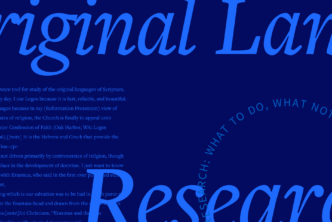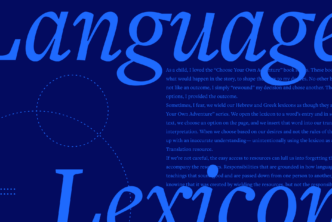Learning biblical Greek will require some drudgery. But, as they say, “No pain, no reading the Greek New Testament.”
I well remember sitting at my desk in grad school, cramming vocabulary into my head like a duck willingly stuffing its body for foie gras. At that desk I said to myself, This is boring and hard and I really don’t like it I need sugar or TV or a TV program about sugar.
But now I can’t imagine my life without Greek. Is learning biblical Greek worth the pain?
Yes, yes, five times yes.
1. The Bible is inspired by God, and the language he chose for the New Testament is Greek.
This is really it, right? Do you need any other reasons to push past the pain? Some of God’s most important words are in Greek. The intricacies of essential NT teaching on righteousness, propitiation, and other topics are found in Greek. Romans 3 was, scholars agree, written in Greek.
Learning biblical Greek (two excellent places to start are the Biblical Greek Foundational Certificate Program and Mounce’s Basics of Biblical Greek workbook and video lectures) may not bring you to God, but it will bring God to you with a specific kind of immediacy available nowhere else. Someone may ask: aren’t the (Greek) words of the New Testament a “medium” standing in between me and God? Is it fair to speak of “immediacy”?
Yes, it is. Actions may speak louder than words, but that is true mainly in the realm of promises. Everywhere else in relationships, it’s words that best reveal to me who someone else is. I’m a guy: I don’t know what my wife is thinking until she tells me. God’s “eternal power and divine nature” are visible through creation, but true clarity about God comes when he speaks. His signal act in history, the resurrection of his Son, could have any number of meanings; he had to explain it to make its true meaning(s) clear. And he chose to explain it in Greek.
If translations are like kissing your beloved through a veil, it’s a very thin veil. Translations are the word of God, too. I insist along with the Christian tradition that they are. But not in precisely the same sense in which the Greek and Hebrew ones are. The thickness of the veil is just enough to make studying Greek worth the pain.
2. Greek is the single most important tool in a Bible interpreter’s toolbelt.
My goal in studying Greek was the same as my goal in all my seminary studies: I wanted to have as much confidence as any human could have that when I said to a Christian congregation, “Thus saith the Lord,” I was representing that Lord accurately. That meant gathering all the tools available for this kind of work and gaining facility in the use of these tools.
I stated this point pretty boldly. Is Greek truly the “most important” tool in my belt? Well, I’d be hard-pressed to come up with a more important one. Facility with linguistic and literary concepts is also highly important. Knowledge of theology, of commentaries, of reference works and journals and monographs and even blogs is all great. But if I had to give up all my tools but one, I’d keep Greek and build the other ones back up.
3. Learning biblical Greek makes you smarter—in English and in other areas.
You already know that the things you worked hardest to earn are the things you value the most, but what you can’t know on the front end is just why you’ll value them. And one of the things I think you’ll find if you study Greek is that your overall power of communication is improved.
If you’ve never studied a second language, you will most definitely begin to see English through new eyes. Its grammar and spelling and pronunciation will stand out in stark relief. Maybe you’ll be that cool person at parties around whom people flock because you know so many etymologies.
Okay, maybe not. But many, many times over the years I have caught and correctly interpreted a difficult word in a book or lecture—a word I’d never heard—because I knew the Greek etymology (polygyny is one, as I recall). This value of improving your overall intelligence cannot be quantified, but it’s very real.
4. Greek knowledge is a ticket into various guilds.
This is nowhere near as important as the first three reasons I’ve given. But knowing Greek is a ticket into various groups and discussions to which you simply won’t have access otherwise. It’s nothing personal, but the B-Greek mailing list kind of tells you right up front by its name that it’s not for those who’ve never studied the language.
Countless online discussions about the Bible, especially those among pastors and academics, require some facility with the original languages. No one is purposefully excluding you if you don’t know Greek, any more than people who know soccer are intentionally leaving me out of all of their discussions. I know almost nothing about “the beautiful game”—except that you can’t touch the ball with your hands while flopping. Soccer aficionados are entirely justified in dismissing my opinions on their sport.
Even a minimal facility with Greek will give you access to some discussions you couldn’t follow or contribute to before.
5. There is a secret intangible benefit I can’t tell you.
“Why do we have to learn this stuff?” is the classic question asked by kids learning grammar. And what can a teacher really say in reply? Along with many things taught in the humanities, the value of grammar is difficult to explain to someone who doesn’t yet possess the knowledge. Sometimes I find myself saying to my children, “You’ll just have to trust me.”
Or trust Moisés Silva, the great biblical linguist (and fellow graduate of my alma mater!):
A measure of proficiency in the biblical languages provides the framework that promotes responsibility in the handling of the text. Continued exposure to the original text expands our horizon and furnishes us with a fresh and more authentic perspective than that which we bring from our modern, English-speaking situation.” (Foundations of Contemporary Interpretation, 278)
Those are vague things to say: “fresh,” “more authentic.” Horizon expansion can’t be quantified. In essence Silva is saying, “Trust me. Learning biblical Greek and studying it is worth it, and you’ll find out when you do it.”
***
Related articles
- Learn Biblical Greek
- A Simple Way to Study Biblical Greek—Whether or Not You Know Greek
- Why I’m Using Logos to Learn Greek—and Loving It
- 6 Resources That Will Help You Learn Greek and Hebrew
- 3 Reasons To Study Greek, and 3 Reasons Not To
- What Does the Greek Word Logos Mean?
Related resources
- Biblical Greek Foundational Certificate Program
- Basics of Biblical Greek (Workbook) by William D. Mounce
- Basics of Biblical Greek (Video lectures)
- Reading Biblical Greek (Video lectures) by Constantine R. Campbell
- Faithlife Greek Grammar Onthology






